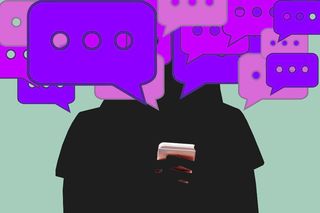
The Cause of Our Tech Addiction Might Also Be the Cure
It turns out we are just hard-wired to love socializing. Now we just have to learn how to do it healthily.

Social media, in theory, was always meant to connect us on a scale never before possible. But anyone who has scanned recent headlines knows just how far from that vision the world really is. The pressure is on tech giants; around the world, regulations are pending against the technological rabbit holes that have prompted society’s anti-social, mobile phone obsession. But what if this addiction to devices isn’t a sign of social engagement in decline, but rather the exact opposite?
“Much has been said about Internet addiction and the new medias and technologies that connect us and make us lonely at the same time, leading to adverse mental health consequences. The deeply prosocial nature of these mechanisms, however, is often understated,” the authors of a new paper examining dysfunctional device use write. For instance, “most smartphone notifications, from email and texting to social media, modulate addictive behavior through the anticipation of social rewards…Smartphones, as we will argue, provide a hyper-efficient extension of deep evolutionary urges for connection with others, learning from others, but also comparing ourselves to and competing with others.”
It’s an attempt to view undeniable societal change, the kind that comes with profound consequences for human lifestyles and health, more positively.
“There is a lot of panic surrounding this topic,” says Samuel Veissière, from the Department of Psychiatry at McGill University, Canada, and the paper’s lead author. “We’re trying to offer some good news and show that it is our desire for human interaction that is addictive — and there are fairly simple solutions to deal with this.”
Veissière, a cognitive anthropologist who studies the evolution of cognition and culture, says the desire to watch and monitor others — but also to be seen and monitored by others — runs deep in our evolutionary past. Humans evolved to be a uniquely social species and require constant input from others to seek a guide for culturally appropriate behavior. This is also a way for us to find meaning, goals, and a sense of identity.
While smartphones harness a normal and healthy need to be social, Veissière agrees that the pace and scale of hyper-connectivity pushes the brain’s reward system to run on overdrive, which can lead to an unhealthy dependence on technology. And yet, he and his co-authors argue, this overload of modernity isn’t a new problem for humans.
“Smartphones and mobile technologies are not the root cause of modern distress. In post-industrial environments where foods are abundant and readily available, our cravings for fat and sugar sculpted by distant evolutionary pressures can easily go into insatiable overdrive and lead to obesity, diabetes, and heart disease (…) the pro-social needs and rewards [of smartphone use as a means to connect] can similarly be hijacked to produce a manic theatre of hyper-social monitoring,” the authors write.
Yet even if it is not new, it is still a problem. The way forward, the authors suggest, is to see our driving force to socialize as the cure for the ill-effects of mobile devices, rather than a risk factor.
“Individuals, rather, can mobilize their intrinsic drive toward sociality to mitigate the negative and increase the positive effects of smartphone use,” they write. “Pursuing healthy social connection is the antidote.”
Turning off push notifications and setting up appropriate times to check your phone can go a long way to regain control over an addiction to online devices. Research suggests that workplace policies “that prohibit evening and weekend emails” are also important.
“Rather than start regulating the tech companies or the use of these devices, we need to start having a conversation about the appropriate way to use smartphones,” Veissière says. “Parents and teachers need to be made aware of how important this is.”
Related:
Related


Study Confirms, Yet Again, Vaccines Do Not Cause Immune System ‘Overload’
